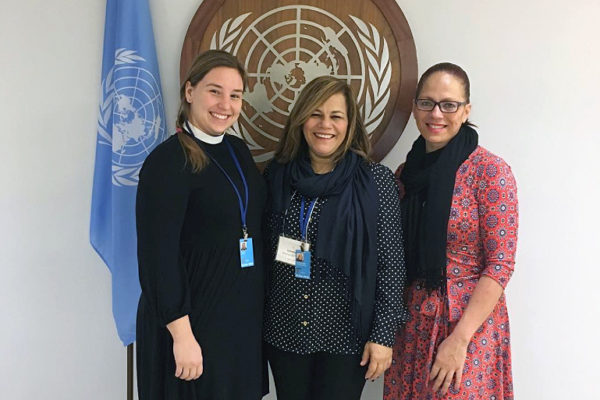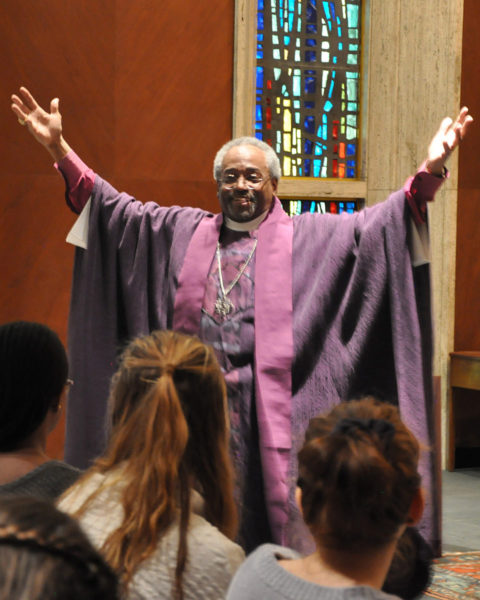As UN women’s meeting ends, Episcopal delegates plan to turn lessons into action back homePosted Mar 23, 2018 |
|

The Rev. Annalise Pasalo of the Diocese of Hawaii, from left, Coromoto Jiménez de Salazar of the Diocese of Venezuela and Demaris DeJesus of the Diocese of Puerto Rico were among the Episcopal Church delegates to the United Nations Commission on the Status of Women, which was held in New York. Photo: Annalise Pasalo, via Instagram
[Episcopal News Service] The 20 Episcopalians representing Presiding Bishop Michael Curry at the United Nations Commission on the Status of Women, or UNCSW, are wrapping up two weeks of meetings, conversations, activities and prayer in New York – an experience they say has emboldened them in their work toward improving the lives of women back in their dioceses.
“I want to spread the word,” the Rev. Annalise Pasalo, a delegate from the Diocese of Hawaii, told Episcopal News Service by phone. “I hope that the wider church is aware of the incredible work that we’re involved in at the U.N.”
Lois Frankforter was part of the Episcopal delegation because of her work as national president of the Girls’ Friendly Society, a Connecticut-based Episcopal organization dedicated to empowering women and girls through its branches in eight dioceses.
“The opportunity to come and be part of the presiding bishop’s delegation really has been a transformative experience,” Frankforter said. The women who spoke at UNCSW told many inspiring stories, she said, but their stories also highlighted the troubling challenges that many women and girls face around the world.
“Out of it, there’s still a sense of hope that, with collective action, we can really make a difference in the world,” Frankforter said. “And it reinforces that there really is place for faith-based organizations to be a voice for advocacy.”
The 62nd UNCSW was held March 12-23, and this year’s themes were gender equality and the empowerment of women and girls in rural communities. The presiding bishop’s delegation included 17 visiting delegates, along with two Episcopal Church staff members and an intern.
The delegation was a diverse group, ranging from 15 to 70 years old and coming from as far away as Venezuela and Puerto Rico, as well as from dioceses across mainland U.S. They also included one man, a researcher from Oklahoma who works on women’s issues there.
As U.N. negotiators worked to finalize and approve a report from the session, much of what the document is expected to contain mirrors the priorities identified by the Episcopal Church, according to Lynnaia Main, the Episcopal Church representative to the United Nations.
“We’ve been learning that the priorities our church has lifted up are very much mainstream,” she said.
Curry had submitted a statement to UNCSW, based on General Convention resolutions. Episcopal delegates looked to that statement and its priorities in shaping their advocacy as they shared their own stories, reflections and concerns during the two weeks.
Curry’s statement called on the U.N. community and civil society to address gender inequality and barriers to empowerment of women and girls by doing the following:
- Prioritize resources and programs for marginalized groups of rural women and girls,
- Extend access to basic resources and services to rural areas,
- Address environmental concerns and extend land rights, and
- Promote gender equality education and practices and eradicate gender-based violence.

“Go, go do your work, don’t get weary,” Presiding Bishop Michael Curry tells the people gathered March 12 in the Chapel of Christ the Lord at the Episcopal Church Center in New York, a few blocks from the United Nations building, for the opening UNCSW Eucharist. Photo: Mary Frances Schjonberg/Episcopal News Service
“You have come to the seat of the nations of the earth to encourage our leaders and to show them how to end the nightmare and realize the dream for all of us,” Curry told the Episcopal delegates and their Anglican counterparts on March 12 at a Eucharist at the Episcopal Church Center that kicked off their work at UNCSW.
One of the messages that rang true for Frankforter was that while mission is global, the work is local.
“That really has hit home, with all the work that we do in all the various churches in our local communities, that everything we’re doing contributes to improve the lives of all,” she said.
Girls’ Friendly Society already is involved in programs at the local level to empower girls and support women. As an example, she said, one of its branches is responding to the problem of human trafficking by collecting basic supplies that can be given to women when they are freed from trafficking. The supplies are offered as “exit bags,” or “bags of hope.”
One lesson Frankforter plans to take home with her from UNCSW is the importance of communication and collaboration among organizations that serve women, so that their good work is amplified. Empowering women is a shared ministry, she said.
“The message really is that it’s going to take everyone at the grassroots level to make change, and that we all have to join together to do that,” she said.
“The other big message was that we have to hold our policymakers accountable … in our government, in our schools, in our communities and in our churches,” she said. “If we don’t hold them accountable then we won’t make the progress that we need to make.”
Pasalo works as a school chaplain at St. Andrew’s Schools, which operates an all-girls school and an all-boys school in Honolulu. Her first steps when she returns from UNCSW will be to share her experiences with others in her community, in presentations scheduled with the local Episcopal Church Women group and the all-girls school’s students. She also expects to speak about her UNCSW experiences at parishes around Honolulu.
The UNCSW included representatives of member states, U.N. entities and nongovernmental organizations like the Episcopal Church that have been accredited by the U.N.’s Economic and Social Council. Pasalo was impressed by the Episcopal Church’s advocacy work with the U.N. and now wants to do her part to bring that work to the local level.
“Though it is global, it’s personal too, so we all have a part to play,” she said.
Pasalo is originally from Oregon and spent some time living in rural areas of the state. She also worked several years in rural Thailand and understands the challenges women face in those kinds of communities. “I see where their lack of infrastructure doesn’t always provide for the needs of the community, especially for women,” she said.
The discussions at UNCSW that resonated most for her were those focusing on improving gender parity at the higher levels of institutions in society. “I would love to see that happen across the board, in schools, in government, in churches,” she said.
The Rev. Glenda McQueen, the Episcopal Church’s partnership officer for Latin America and the Caribbean, said it was important that the UNCSW hears voices from the church’s Province IX, where problems of infrastructure, health care and access to education are a grim reality for many women and girls in rural areas.
“There are kids that have to walk hours to get to an elementary school,” she said, and some girls don’t have access to a high school education or have to stay home to work and help support their families.
McQueen appreciated the sessions at UNCSW that offered ideas for bringing better health care and technology to such communities to improve women’s lives there. The goal, she said, should be to leave no one behind in this global economy, and Episcopalians are well equipped to take up that cause.
“Prayer is also political action,” she said. “It’s praying together, but it’s also beginning to implement projects and programs. It’s also being able to access our government, our local community officials and going beyond that and raising these issues.”
– David Paulsen is an editor and reporter for the Episcopal News Service. He can be reached at dpaulsen@episcopalchurch.org.

Social Menu